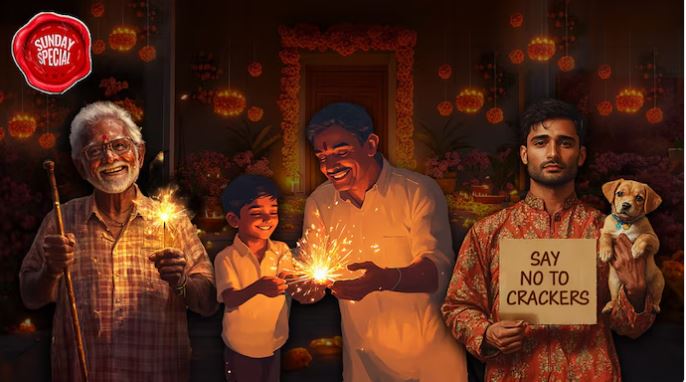
Diwali, the Festival of Lights, is a time for joy and celebration in India. However, the tradition of bursting firecrackers has led to significant hazards in recent years. In 2024, numerous incidents across major cities highlighted the hazards of firecrackers. The need for a blanket ban on firecrackers has not been more pressing than ever. Let’s explore the health risks, recent incidents, and eco-friendly alternatives to celebrate festivals like Diwali responsibly.
The Health Risks of Firecrackers
Firecrackers release harmful pollutants into the air. According to the World Health Organization (WHO), air pollution contributes to respiratory diseases, heart problems, and premature deaths. This year, hospitals reported a surge in patients suffering from respiratory issues post-Diwali. In cities like Delhi and Bengaluru, emergency rooms were inundated with cases of asthma attacks and other respiratory ailments.
Dr. Paritosh Baghel, an internal medicine expert, stated, “The air quality during and after Diwali can be extremely harmful, especially for children.” He emphasized that exposure to toxic air can lead to long-term health issues. The statistics are alarming; studies show that air quality can drop by 40% during Diwali due to firecracker emissions.
Recent Incidents Across Major Cities
In 2024, several dangerous incidents related to firecrackers were reported:
- Tamil Nadu Incidents: The state recorded 544 injuries and one death due to firecracker-related accidents, with a total of 150 fire incidents reported during Diwali this year. Chennai accounted for 48 of these incidents.
- Bengaluru Tragedy: A tragic incident occurred when a man died after sitting on a box of lit fireworks as part of a dare. This reckless act resulted in severe burn injuries and highlighted the dangers of irresponsible behavior during celebrations.
- Air quality plummets in Delhi: The capital experienced over 320 emergency calls related to firecracker accidents on Diwali night. Reports indicated multiple injuries and at least three fatalities due to fire-related incidents. Notably, one major incident involved a fire on a Delhi Transport Corporation bus due to ignited crackers carried by a passenger. The air quality also deteriorated significantly due to rampant firecracker use, exacerbating health risks for residents.
- Fatal Dispute in Mumbai: A violent altercation over firecracker usage led to the death of Vivek Gupta, a 20-year-old man, who was stabbed during a confrontation that erupted when he asked a group to move their celebrations to a safer location. This incident highlights the potential for violence surrounding firework use during festivals.
- Respiratory issues in Kolkata: Hospitals reported a surge in patients suffering from respiratory issues due to pollution from fireworks. Many individuals with pre-existing conditions like asthma experienced exacerbated symptoms, leading to increased emergency visits
- Eye Injuries in Hyderabad: The Sarojini Devi Eye Hospital treated 48 patients for eye injuries caused by firecrackers. Many victims required surgical intervention due to severe damage. This included several children, highlighting the particular risk to younger individuals during Diwali festivities.
- Eluru Onion Bomb Explosion: In Andhra Pradesh’s Eluru district, a man named Sudhakar was killed when an “onion bomb” he was carrying exploded after he hit a pothole while riding his scooter. This type of firecracker is known for its powerful blasts and is often restricted due to its dangerous nature. The explosion also injured several bystanders, with two individuals in critical condition.
- Puri Firecracker Blast: In Odisha, two young boys lost their lives due to a firecracker explosion in Puri, while over 50 others were injured in separate incidents across the state.
- Kanpur House Fire: A house fire in Kanpur claimed the lives of prominent businessman Sanjay Shyam Dasani and his family after an unattended diya ignited flammable materials in their home. This incident underscores the broader safety risks associated with Diwali celebrations beyond just firecrackers.
- Explosion in Kasargod: As thousands gathered to witness the Theyyam performance on the night of October 29th, at the Anjootambalam Veerakavu Temple near Neeleswaram in Kasargod district of Kerala, a series of explosions erupted when sparks from fireworks ignited a nearby storage shed filled with firecrackers. As per latest reports, the death toll has reached 5, with more than 150 people injured.
These incidents paint a grim picture of the consequences of bursting firecrackers during Diwali and other festivals.
Fatalities Related to Objecting to Firecrackers
In addition to the injuries, there were also fatalities linked to violent incidents during the celebrations:
- In Faridabad, a 65-year-old man was lynched after he objected to fireworks being set off outside his home. This altercation escalated into violence, resulting in his death1.
- In Uttar Pradesh, a woman named Kalawati was beaten to death after protesting against fireworks set off by her neighbor. This incident stemmed from an ongoing dispute and highlights the extreme reactions that can occur during festive celebrations1.
These incidents underscore the ongoing challenges associated with firecracker use during festivities, including not only physical injuries but also community violence stemming from disputes over noise and safety concerns.
What are the major hazards of Firecrackers?
Bursting firecrackers poses several dangers:
- Air Pollution: Firecrackers release toxic gases and particulate matter into the atmosphere. This leads to poor air quality, which can aggravate existing health conditions.
- Noise Pollution: The loud sounds from firecrackers can cause stress and anxiety in both humans and animals. It disrupts wildlife habitats and affects pets.
- Physical Injuries: Firecracker accidents often result in severe injuries. Burns, eye injuries, and hearing loss are some common consequences.
- Environmental Impact: Firecracker waste contributes significantly to pollution. Non-biodegradable materials used in crackers harm ecosystems.
Given these factors, it’s clear that banning firecrackers is imperative for public health and environmental protection.
Promoting Eco-Friendly Celebrations
Instead of traditional celebrations involving firecrackers, we should embrace eco-friendly alternatives:
- Use Clay Diyas: Opt for traditional clay diyas instead of electric lights or plastic decorations. They are biodegradable and promote local artisanship.
- Natural Rangoli: Create beautiful rangolis using natural colors like turmeric or flower petals instead of chemical dyes. This reduces pollution while keeping traditions alive.
- LED Lights: Choose energy-efficient LED lights for decoration. They consume less electricity and have a longer lifespan compared to traditional bulbs.
- Community Clean-Up Drives: Organize community events to clean up after celebrations. This fosters a sense of responsibility towards the environment.
- Eco-Friendly Gifts: Gift sustainable products like indoor plants or handmade items instead of plastic toys or non-biodegradable gifts.
- Celebrate with Sparklers: If you must have fireworks, consider eco-friendly options that produce less noise and smoke.
By adopting these practices, we can celebrate our festivals without compromising our health or the environment.
The Call for a Ban on Firecrackers
The increasing number of accidents and health issues related to firecrackers calls for urgent action. A blanket ban on bursting firecrackers could significantly reduce air pollution and prevent injuries during festivals. This also raises the question whether Green crackers are as eco-friendly as they claim to be.
Many states like Delhi have already implemented a ban or restrictions on firecracker sales during Diwali due to health concerns. However, these measures need to be enforced more strictly across the country.
Government officials should work alongside environmental organizations to promote awareness about the dangers of firecrackers. Public campaigns can educate citizens about the benefits of celebrating festivals like Diwali in an eco-friendly manner.
Conclusion: A Holistic Change is Needed
As we reflect on the hazards caused by firecrackers during the Diwali, 2024 celebrations in India, it is clear that change is necessary. We must prioritize health and environmental sustainability over tradition. By promoting eco-friendly practices and enforcing a ban on firecrackers, we can ensure safer celebrations for future generations.
Let’s come together as a community to embrace sustainable practices in future! Make your pledge today—choose eco-friendly alternatives and spread awareness about the importance of celebrating festivals and occasions without harming our planet.
Are you ready to celebrate in an eco-friendly manner, by saying NO to firecrackers? Share your thoughts below!
